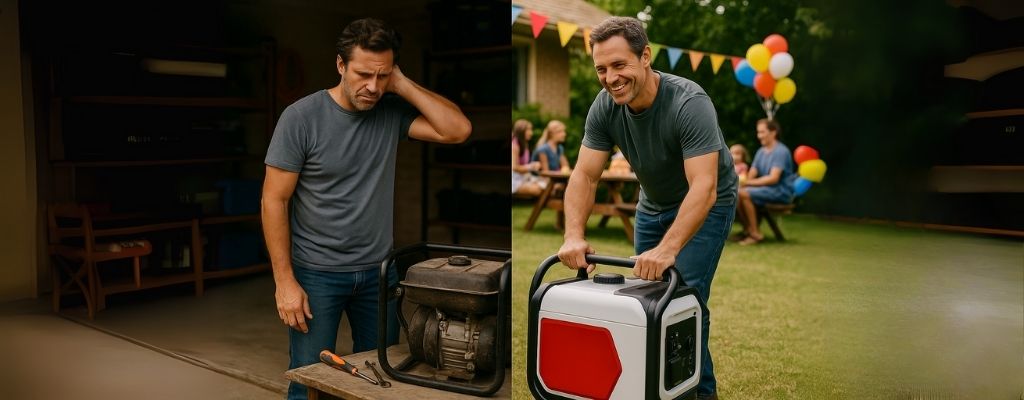
Should I Rent or Buy a Generator?
When the power cuts out, do you want to own the backup plan—or just borrow it? That’s the big question. The short answer? Rent a generator if you need it once or twice. Buy one if blackouts are your regular uninvited guests.

Let’s break it down, Aussie-style.
The Advantages and Disadvantages of Renting a Generator
Cost-Effectiveness for Short-Term Needs
Renting a generator makes a lot of sense if your power problems are occasional—think a weekend camping trip, a big outdoor event, or a rare blackout in suburbia. Why buy a generator that'll sit in the shed collecting dust 360 days of the year?
What a Rental Generator Includes: Fees and Hidden Costs
Most rental companies charge a daily or weekly fee. But don’t forget the extras—delivery, fuel, maybe a bond, and sometimes a cleaning or maintenance fee if it comes back a bit worse for wear.
Always ask for a full quote upfront so you’re not caught off-guard. It’s like hiring a car—you want to know if that full tank needs to come back full.
The Benefits of a Rental Generator During a One-Time Event
Whether it’s a wedding in the bush or a temporary job site, rental generators offer quick power without commitment. You're sorted for that event, and once it’s done, you hand it back—no storage, no hassle.
It's ideal for those “just in case” scenarios where owning one would be overkill.

Convenience and Flexibility in a Rental Generator
Access to a Variety of Generator Sizes and Types
One size doesn’t fit all. Need a small inverter for a food truck pop-up? Sorted. Need a beefy three-phase unit for a worksite? Easy.
Rental providers stock everything from compact units to commercial monsters, so you’re never stuck with something too weak or too much.
The Freedom from Maintenance, Storage, and Repairs
The best part about renting? You don’t have to think about oil changes, spark plugs, or where to keep the thing. If it breaks, the hire company handles it. If your garage is already packed, that’s one less thing to squeeze in.
It’s power on-demand, minus the upkeep.

The Advantages and Disadvantages of Buying a Generator
Financial and Long-Term Value in Owning a Generator
If you live somewhere that cops regular blackouts—or you just like being self-sufficient—owning a generator is a smart move. You pay upfront, but over time, it works out cheaper than repeat rentals.
Upfront Costs vs. Long-Term Investment in a Generator
Yes, the initial spend might sting a bit. A decent portable generator can cost anywhere from $500 to several thousand depending on what you need it to run.
But once it’s yours, it's paid for. No ongoing rental fees. Just fuel, minor maintenance, and the occasional service.
Understanding Resale Value and Asset Ownership
If you look after your generator, it’ll still be worth a fair bit down the track. You can sell it or trade it in if you upgrade.
It’s not just a purchase—it’s an asset. And in some business cases, it can even be tax-deductible. Talk to your accountant.
Reliability and Customisation of a Purchased Generator
Choosing the Right Generator for Your Home or Business
When you own your generator, you can tailor it to your setup. Whether you need silent running for a mobile coffee van, or enough grunt to run a whole house during storms, there’s a unit that fits.
You pick it. You know it. You trust it.
Long-Term Maintenance and Care for Your Generator
Of course, ownership comes with responsibility. Regular servicing is essential to keep your generator in top nick. Oil changes, battery checks, cleaning air filters—nothing dramatic, but not something you can ignore.
But for many, the reliability of having power on tap is worth every bit of upkeep.

Making the Final Decision for a Generator
A Quick Checklist Before Deciding on a Generator
Still torn? Here's what to ask yourself:
-
How often do you lose power?
-
How long are your outages?
-
Do you have space to store a generator?
-
Can you handle the maintenance (or afford someone who can)?
-
Is it for work, home, or one-off events?
If you tick more boxes for short-term, low-effort use—renting is your friend. If you’re in it for the long haul—buying is probably smarter.
When to Consult a Professional About a Generator
If you're unsure what size you need or if your setup is more complex (like backup power for medical devices or 3-phase tools), chat with a licensed electrician or generator specialist. They’ll make sure you don’t underpower or overspend.
Because when the lights go out, guessing isn’t a great strategy.
You might also like:
-
What Happens If You Don't Ground a Generator?
- Where Are Generators Made?
- Who Repairs Generators?
- What’s the Warranty on Most Generators?
- Are Refurbished Generators Worth Buying?
- Are Generators Eco-Friendly?
- What Are the Zoning Laws for Standby Generators?
- How Do I Prepare a Generator for a Hurricane?
- How Do Sand and Dust Affect Generators?
- What Insurance Considerations Are There for Generators?


